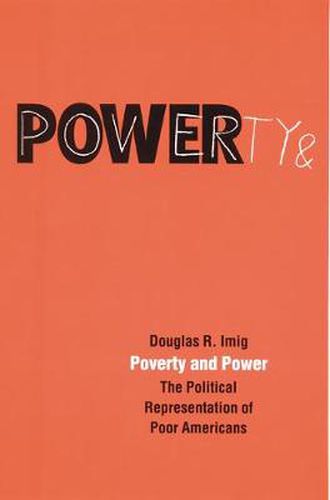Readings Newsletter
Become a Readings Member to make your shopping experience even easier.
Sign in or sign up for free!
You’re not far away from qualifying for FREE standard shipping within Australia
You’ve qualified for FREE standard shipping within Australia
The cart is loading…






[Poverty and Power] provides an unusual study of the politics of the poor during the 1980s…An account we need. –Frances Fox Piven, coauthor with Richard A. Cloward of Regulating the Poor: The Functions of Public Welfare and Poor People’s Movements: Why They Succeed, How They Fail. An altogether exemplary work that adds much to our understanding of the links between institutional and non-institutional politics. –Doug McAdam, author of Freedom Summer. During the 1980s the rich got richer while the poor got poorer. In 1981 alone, 70 percent of the $35 billion cut from the federal budget came from programs for the poor. Although the disparity in incomes has been widely reported, the efforts of antipoverty activists and groups combating the Reagan/Bush agenda have largely been overlooked. Poverty and Power follows the rise, decline, and partial resurgence of poor Americans’ representation from the War on Poverty to the Reagan Revolution. Drawing on personal interviews and financial reports, Douglas R.Imig examines the political activity and organizational crises of antipoverty groups including the Center on Social Welfare Policy and Law, the Food Research and Action Center, the Community Nutrition Institute, Bread for the World, the Center on Budget and Policy Priorities, and the Children’s Defense Fund. His findings delineate how electoral policy and economic change in the 1980s posed a direct threat to the welfare of the poor, and suggest reasons why no massive mobilization for social justice emerged. Still, the dogged efforts of advocates and activists culminated in the passage of the 1987 McKinney Homeless Assistance Act, the first positive federal intervention into domestic social policy since the Reagan inauguration. Imig helps us understand the complex relationships between opportunity and action that characterize all social movements. Douglas R. Imig is an assistant professor of public administration at the University of Nevada, Las Vegas.
$9.00 standard shipping within Australia
FREE standard shipping within Australia for orders over $100.00
Express & International shipping calculated at checkout
[Poverty and Power] provides an unusual study of the politics of the poor during the 1980s…An account we need. –Frances Fox Piven, coauthor with Richard A. Cloward of Regulating the Poor: The Functions of Public Welfare and Poor People’s Movements: Why They Succeed, How They Fail. An altogether exemplary work that adds much to our understanding of the links between institutional and non-institutional politics. –Doug McAdam, author of Freedom Summer. During the 1980s the rich got richer while the poor got poorer. In 1981 alone, 70 percent of the $35 billion cut from the federal budget came from programs for the poor. Although the disparity in incomes has been widely reported, the efforts of antipoverty activists and groups combating the Reagan/Bush agenda have largely been overlooked. Poverty and Power follows the rise, decline, and partial resurgence of poor Americans’ representation from the War on Poverty to the Reagan Revolution. Drawing on personal interviews and financial reports, Douglas R.Imig examines the political activity and organizational crises of antipoverty groups including the Center on Social Welfare Policy and Law, the Food Research and Action Center, the Community Nutrition Institute, Bread for the World, the Center on Budget and Policy Priorities, and the Children’s Defense Fund. His findings delineate how electoral policy and economic change in the 1980s posed a direct threat to the welfare of the poor, and suggest reasons why no massive mobilization for social justice emerged. Still, the dogged efforts of advocates and activists culminated in the passage of the 1987 McKinney Homeless Assistance Act, the first positive federal intervention into domestic social policy since the Reagan inauguration. Imig helps us understand the complex relationships between opportunity and action that characterize all social movements. Douglas R. Imig is an assistant professor of public administration at the University of Nevada, Las Vegas.